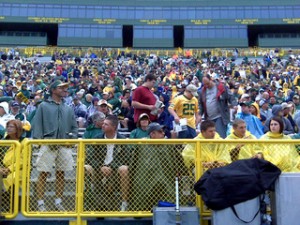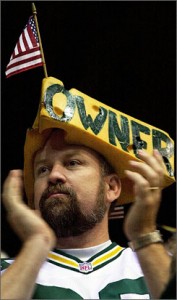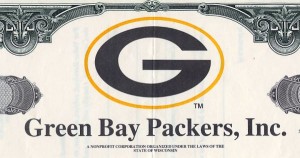
By Jake McCormick
Editor’s note: More meeting photographs will be posted Monday
 A guy in full 1920s ACME Packer garb, a cheesehead with NFL OWNER tattooed on its side, a Minnesota license plate reading GBPCKRS, and beer served at 11 a.m. – sounds like a typical day at Lambeau Field.
A guy in full 1920s ACME Packer garb, a cheesehead with NFL OWNER tattooed on its side, a Minnesota license plate reading GBPCKRS, and beer served at 11 a.m. – sounds like a typical day at Lambeau Field.
Concerns were abound at the annual Green Bay Packer shareholder meeting, but the mood was light and optimistic compared to last year’s gathering. I’ll let you guess the reason why. If you don’t know, please stop reading. That’s like asking what the second highest selling beer in the country is behind Budweiser.
In a simulation of the start of the shareholder meeting Thursday, I’ll quickly remove the “1,000 lb white elephant in the room,” as Packer President Mark Murphy put it.
“The Brett Favre situation did severely test the organization,” he said, looking much more comfortable saying the name than he did last year. It reminded me of the King of the Hill episode where Peggy had to teach sexual education and struggled to say “penis” and “vagina.” When she got past that fear, her mouth was an open floodgate of genital names. Anyways…
“We wanted to be fair to him, but we felt we had to act in the best long-term interests of the Packers,” Murphy added, to a collective round of applause from the team “owners.”
He then drew the first of many ovations at the mention of current quarterback Aaron Rodgers. He expressed total confidence in Rodgers’ leadership abilities and future with the team. “I’m confident we’re set for the next decade under Aaron Rodgers,” Murphy said.
Murphy led the meeting and spent most of his time in front of the 7,500 Packer crowd addressing the upcoming issues surrounding the collective bargaining agreement between the NFL Players Union and team owners.
“This is the biggest issue we’ll face over the next two years,” Murphy said, before explaining the origins of the CBA and its evolution over time.
NFL team owners have chosen to opt out of the current agreement, citing concerns over increasing player salaries compared to team revenues and high pay for unproven rookies. If the agreement isn’t ratified by both sides by March 2010, Murphy said that season will go on without the salary cap. Although it sounds much more problematic for owners, Murphy was quick to point out the problems players will face if stuck without an agreement.
“Not only does the cap go away, but free agency changes and player benefits will go away,” he said. “So there’s definitely an incentive on both sides to get a deal done.”

Looking around the stands filled with Packer “owners” from all across the country listening intently to cut-and-dry reports on the financial stability of their organization, I realized the unique structure of the Green Bay Packer franchise. Sure, Jerry Jones gives Dallas Cowboy fans his “State of the Cowboys” address, but would he ever stand and meet each of those fans and listen to their concerns about the franchise as if he were a senator?
After the meeting, Murphy and Thompson trekked over to the Don Hutson Center to meet and greet with shareholders. Packer fans aren’t afraid to speak their minds about their team, especially when it concerns Brett Favre, and last year Thompson heard it from a lot of angry “owners.” But the President and GM both received nothing but words of encouragement as they signed souvenirs and answered questions about players and coaches.

Would you prefer to have at least some say in your favorite team’s operating procedures or have one owner who doesn’t have to answer to anyone, like a dictatorship? I’ll take the former, and I think the Packers’ unique system could be beneficial to other teams. Obviously there is a higher chance of alien contact on the Moon than seeing someone like Ralph Brown sell the Bills in public shares, but knowing you’re more to a team than just a fan is a feeling that most people should be allowed to experience.